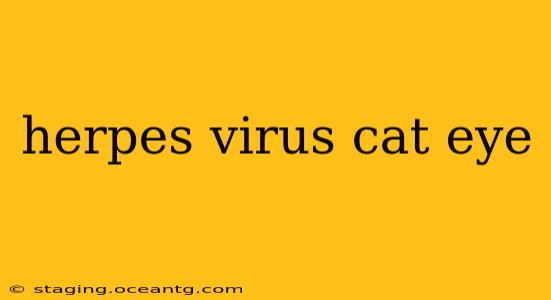The phrase "herpes virus cat eye" often refers to feline herpesvirus type 1 (FHV-1), a common and highly contagious virus affecting cats. While not directly causing a condition explicitly called "cat eye," FHV-1 can lead to severe eye infections in felines, resulting in significant discomfort and potential long-term complications. Understanding this virus and its impact on a cat's ocular health is crucial for responsible pet ownership.
What is Feline Herpesvirus Type 1 (FHV-1)?
FHV-1 is a DNA virus primarily transmitted through direct contact with infected cats, such as through sneezing, coughing, or sharing food and water bowls. The virus can remain latent within the cat's body, reactivating under stressful conditions like illness, trauma, or changes in environment. While kittens are especially susceptible, adult cats can also contract and suffer from FHV-1 infections.
How Does FHV-1 Affect a Cat's Eyes?
FHV-1 primarily targets the mucous membranes of the respiratory and ocular systems. In the eyes, infection can manifest as:
- Conjunctivitis: Inflammation of the conjunctiva (the membrane lining the eyelids and covering the white part of the eye), characterized by redness, swelling, and discharge (often watery or purulent).
- Keratitis: Inflammation of the cornea (the transparent front part of the eye), causing pain, cloudiness, and potential ulceration. Severe keratitis can lead to blindness if left untreated.
- Uveitis: Inflammation of the uvea (the middle layer of the eye), which can cause pain, reduced vision, and potentially glaucoma.
What are the Symptoms of FHV-1 Eye Infection in Cats?
Recognizing the symptoms early is critical for effective treatment. Common signs include:
- Squinting or watery eyes: The cat may keep its eyes partially closed or exhibit excessive tearing.
- Discharge from the eyes: This discharge can range from clear and watery to thick and yellowish-green.
- Redness or swelling of the eyelids: The eyelids may appear inflamed and swollen.
- Cloudiness of the cornea: The normally clear cornea may appear hazy or cloudy.
- Sensitivity to light: The cat may avoid bright lights or seem bothered by them.
- Ulcers on the cornea: In severe cases, visible ulcers may develop on the surface of the cornea.
Can Feline Herpesvirus Be Treated?
While there's no cure for FHV-1, veterinary treatment focuses on managing symptoms and preventing complications. Treatment options may include:
- Antiviral medications: These help suppress viral replication and reduce the severity of the infection.
- Antibiotics: If a secondary bacterial infection develops, antibiotics may be necessary.
- Eye drops or ointments: These can help soothe irritated eyes, reduce inflammation, and promote healing. These are often crucial in managing corneal ulcers.
- Pain relief: Medications to manage pain and discomfort are often necessary, especially during acute phases of infection.
How Can I Prevent FHV-1 Infection in My Cat?
Preventing FHV-1 infection is crucial. Here are some key preventive measures:
- Vaccination: A vaccine is available to help protect cats from FHV-1, particularly kittens.
- Hygiene: Maintain good hygiene by regularly cleaning food and water bowls and litter boxes.
- Isolation: If a cat is diagnosed with FHV-1, isolate it from other cats to prevent the spread of the virus.
- Stress Reduction: Minimizing stress on your cat can help prevent reactivation of latent FHV-1.
Is Feline Herpesvirus Contagious to Humans?
While FHV-1 is specific to cats, there's no evidence to suggest it is contagious to humans. However, maintaining good hygiene practices is always recommended when handling any animal.
How is FHV-1 Diagnosed?
Diagnosis often involves a veterinary examination, which may include a thorough assessment of the cat's eyes, examination of any discharge, and possibly additional diagnostic tests such as PCR testing to confirm the presence of FHV-1.
This information is for educational purposes only and should not be considered a substitute for professional veterinary advice. If you suspect your cat has an eye infection or FHV-1, consult a veterinarian immediately for proper diagnosis and treatment. Early intervention can significantly improve the prognosis and prevent serious complications.
